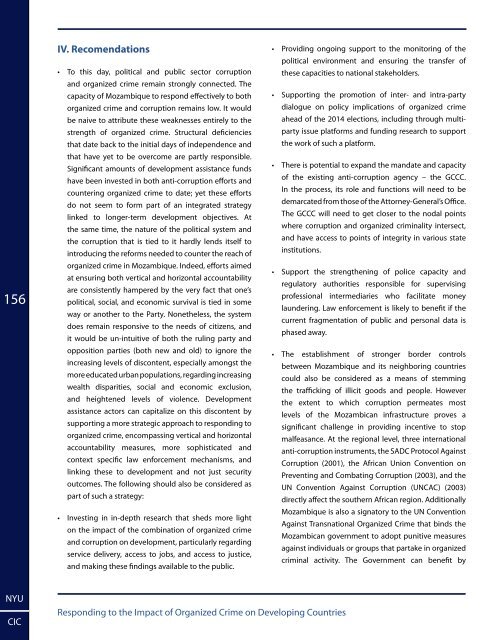here - Center on International Cooperation - New York University
here - Center on International Cooperation - New York University
here - Center on International Cooperation - New York University
You also want an ePaper? Increase the reach of your titles
YUMPU automatically turns print PDFs into web optimized ePapers that Google loves.
156<br />
IV. Recomendati<strong>on</strong>s<br />
• To this day, political and public sector corrupti<strong>on</strong><br />
and organized crime remain str<strong>on</strong>gly c<strong>on</strong>nected. The<br />
capacity of Mozambique to resp<strong>on</strong>d effectively to both<br />
organized crime and corrupti<strong>on</strong> remains low. It would<br />
be naive to attribute these weaknesses entirely to the<br />
strength of organized crime. Structural deficiencies<br />
that date back to the initial days of independence and<br />
that have yet to be overcome are partly resp<strong>on</strong>sible.<br />
Significant amounts of development assistance funds<br />
have been invested in both anti-corrupti<strong>on</strong> efforts and<br />
countering organized crime to date; yet these efforts<br />
do not seem to form part of an integrated strategy<br />
linked to l<strong>on</strong>ger-term development objectives. At<br />
the same time, the nature of the political system and<br />
the corrupti<strong>on</strong> that is tied to it hardly lends itself to<br />
introducing the reforms needed to counter the reach of<br />
organized crime in Mozambique. Indeed, efforts aimed<br />
at ensuring both vertical and horiz<strong>on</strong>tal accountability<br />
are c<strong>on</strong>sistently hampered by the very fact that <strong>on</strong>e’s<br />
political, social, and ec<strong>on</strong>omic survival is tied in some<br />
way or another to the Party. N<strong>on</strong>etheless, the system<br />
does remain resp<strong>on</strong>sive to the needs of citizens, and<br />
it would be un-intuitive of both the ruling party and<br />
oppositi<strong>on</strong> parties (both new and old) to ignore the<br />
increasing levels of disc<strong>on</strong>tent, especially am<strong>on</strong>gst the<br />
more educated urban populati<strong>on</strong>s, regarding increasing<br />
wealth disparities, social and ec<strong>on</strong>omic exclusi<strong>on</strong>,<br />
and heightened levels of violence. Development<br />
assistance actors can capitalize <strong>on</strong> this disc<strong>on</strong>tent by<br />
supporting a more strategic approach to resp<strong>on</strong>ding to<br />
organized crime, encompassing vertical and horiz<strong>on</strong>tal<br />
accountability measures, more sophisticated and<br />
c<strong>on</strong>text specific law enforcement mechanisms, and<br />
linking these to development and not just security<br />
outcomes. The following should also be c<strong>on</strong>sidered as<br />
part of such a strategy:<br />
• Investing in in-depth research that sheds more light<br />
<strong>on</strong> the impact of the combinati<strong>on</strong> of organized crime<br />
and corrupti<strong>on</strong> <strong>on</strong> development, particularly regarding<br />
service delivery, access to jobs, and access to justice,<br />
and making these findings available to the public.<br />
• Providing <strong>on</strong>going support to the m<strong>on</strong>itoring of the<br />
political envir<strong>on</strong>ment and ensuring the transfer of<br />
these capacities to nati<strong>on</strong>al stakeholders.<br />
• Supporting the promoti<strong>on</strong> of inter- and intra-party<br />
dialogue <strong>on</strong> policy implicati<strong>on</strong>s of organized crime<br />
ahead of the 2014 electi<strong>on</strong>s, including through multiparty<br />
issue platforms and funding research to support<br />
the work of such a platform.<br />
• T<str<strong>on</strong>g>here</str<strong>on</strong>g> is potential to expand the mandate and capacity<br />
of the existing anti-corrupti<strong>on</strong> agency – the GCCC.<br />
In the process, its role and functi<strong>on</strong>s will need to be<br />
demarcated from those of the Attorney-General’s Office.<br />
The GCCC will need to get closer to the nodal points<br />
w<str<strong>on</strong>g>here</str<strong>on</strong>g> corrupti<strong>on</strong> and organized criminality intersect,<br />
and have access to points of integrity in various state<br />
instituti<strong>on</strong>s.<br />
• Support the strengthening of police capacity and<br />
regulatory authorities resp<strong>on</strong>sible for supervising<br />
professi<strong>on</strong>al intermediaries who facilitate m<strong>on</strong>ey<br />
laundering. Law enforcement is likely to benefit if the<br />
current fragmentati<strong>on</strong> of public and pers<strong>on</strong>al data is<br />
phased away.<br />
• The establishment of str<strong>on</strong>ger border c<strong>on</strong>trols<br />
between Mozambique and its neighboring countries<br />
could also be c<strong>on</strong>sidered as a means of stemming<br />
the trafficking of illicit goods and people. However<br />
the extent to which corrupti<strong>on</strong> permeates most<br />
levels of the Mozambican infrastructure proves a<br />
significant challenge in providing incentive to stop<br />
malfeasance. At the regi<strong>on</strong>al level, three internati<strong>on</strong>al<br />
anti-corrupti<strong>on</strong> instruments, the SADC Protocol Against<br />
Corrupti<strong>on</strong> (2001), the African Uni<strong>on</strong> C<strong>on</strong>venti<strong>on</strong> <strong>on</strong><br />
Preventing and Combating Corrupti<strong>on</strong> (2003), and the<br />
UN C<strong>on</strong>venti<strong>on</strong> Against Corrupti<strong>on</strong> (UNCAC) (2003)<br />
directly affect the southern African regi<strong>on</strong>. Additi<strong>on</strong>ally<br />
Mozambique is also a signatory to the UN C<strong>on</strong>venti<strong>on</strong><br />
Against Transnati<strong>on</strong>al Organized Crime that binds the<br />
Mozambican government to adopt punitive measures<br />
against individuals or groups that partake in organized<br />
criminal activity. The Government can benefit by<br />
NYU<br />
CIC<br />
Resp<strong>on</strong>ding to the Impact of Organized Crime <strong>on</strong> Developing Countries
















